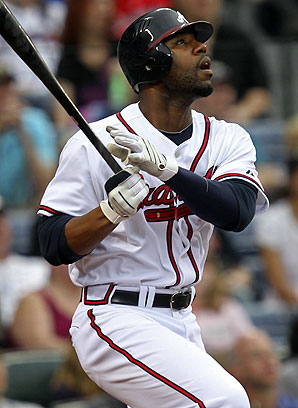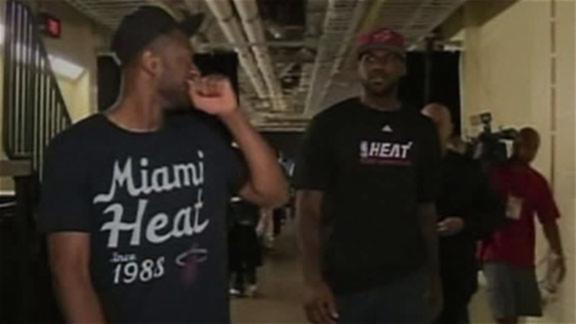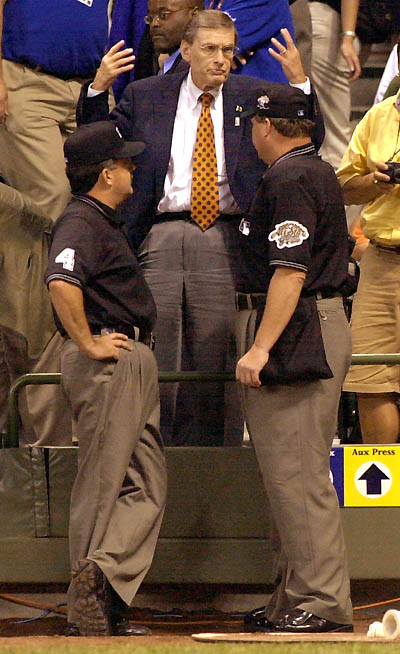The Braves are in an interesting position. Back in May, the Braves were viewed as a team without many significant needs, maybe needing a right-handed bat off the bench. However, as they often do, things have changed. The Braves need to make at least one deal for several reasons.
1. Injuries. With Brian McCann out for at least two weeks and probably longer, the lineup is suddenly lacking his dependable punch. Chipper Jones being hurt is no shock, but his questionable availability only adds pressure on GM Frank Wren to add a bat.
 |
| Heyward may still be a future star, but he's just not hitting like one now. |
3. An overworked bullpen. Jonny Venters can't pitch every day, but he almost does. The same goes for Eric O'Flaherty. These guys can't continue to be the only options in the eighth inning, but it's pretty obvious that Fredi Gonzalez (justifiably) doesn't trust Scott Proctor or Scott Linebrink in those situations. Atlanta needs another powerful arm, preferably a right-hander.
4. Other teams are getting better. By getting Carlos Beltran, the defending champion Giants almost look like locks to be in the postseason, and their lineup is now better than Atlanta's. If the Braves get the wild card, a first-round rematch with San Francisco is likely. Atlanta needs to be able to score on the Giants' electric staff, and their current lineup doesn't look to have the punch. Plus, you have to assume the Phillies will improve as will other contenders like the Brewers, Cardinals, and Pirates.
So, what should the Braves do? They need a right-handed bat, ideally one that can play center. They also could use that arm in the bullpen. They have plenty of prized pitching prospects. Lefty Mike Minor is the most major-league ready, but Julio Teheran, Arodys Vizcaino and Randall Delgado are also down on the farm with a lot of potential. They were reluctant to give up any of them for a two-month rental like Beltran. The injuries to McCann and Jones, however, may force them to change their minds. Personally, I don't think all of those guys fit into the Braves' rotation next year or even in 2013 or 2014. Jair Jurrjens, Tommy Hanson, and Brandon Beachy all turn 25 this year and figure to be staples in the Atlanta rotation for a while. Plus, if Kris Medlen (age 26) returns successfully from Tommy John surgery, he'll also be fighting for a rotation spot next year.
If my opinion matters (and it doesn't), I say keep Minor because he's the only lefty and the most major-league ready (He's also the first guy to fill in if an Atlanta starter gets hurt). Keep Teheran because he has the highest ceiling. If dealing Delgado can help you get to the playoffs and maybe a World Series, do it.
Let's look at the options.
 |
| I like Upton's potential, but not his OPS. |
B.J. Upton is an interesting name. With great speed and defense, his athleticism is unquestionable. His plate discipline, however, is not. His .228 average, 100 strikeouts, and .309 on-base percentage really don't make him much of an upgrade over Heyward or Nate McLouth. The only advantage he has over those guys is being right-handed, meaning he'd probably platoon in center with McLouth and Jordan Schafer (currently injured). The Braves have to be certain Upton would hit better in the National League if they were going to give up one of their prized pitching prospects for the inconsistent Upton.
Carlos Quentin of the White Sox has been mentioned a lot. His power would instantly make him the best (healthy) bat in the Braves lineup. The downside is that he can't play center, meaning Heyward would see his playing time cut. However, as I mentioned earlier, that's a concession Atlanta probably has to make. Quentin would be a great fit. The big obstacle, however: the White Sox are only three games out of first in the weak AL Central. If Chicago decides it's going to contend, Quentin should probably stay, which means the Braves would have to give up the farm to pry him away. I don't think it happens for that reason. Atlanta may be willing to give up one prized pitching prospect, but I bet Chicago asks for at least two.
 |
| Keeping Pence out of Philly would be a bonus for Atlanta. |
Pence is due a big raise after this season, but the Braves can be flexible there. If Chipper Jones retires, then Prado moves to third in 2012 and Pence takes over in left every day. If Jones returns, the Braves could easily trade Pence if they decide he doesn't fit into next year's plans. (The situation would be the same with Quentin, by the way.)
Worry about this year first, though. Atlanta would love to have Pence's bat, and keeping him out of Philadelphia would be an added bonus. If a trade not involving Teheran can be worked out with Houston, Pence is probably worth it, especially if the Astros would accept Delgado instead of Minor.
 |
| The price on Adams is likely high, but he might be worth it. |
Ludwick, meanwhile, may not have the power numbers of Quentin or the athleticism of Upton, he is a right-handed bat that could see spot starts in all three outfield positions and hit for power, whether he's starting or pinch-hitting. I think the combination of Adams and Ludwick would be well worth a prized prospect like Delgado and maybe a few other minor leaguers to help San Diego's farm system. If that deal can be agreed to without having to give up any of Atlanta's other three prized pitching prospects, Atlanta absolutely has to do it. I just think San Diego would want two of Atlanta's prized arms, and that might be a tough sell for Wren, especially when those young arms could possibly be promoted to help the bullpen this season.
From a production standpoint, Oakland's Josh Willingham is similar to Ludwick. He is hitting for a low average this year (.244), but still has some pop (13 homers). I would think he's probably at best Plan D for Frank Wren, but he wouldn't be a bad consolation if everything else falls through. Although, he'd probably mostly be a right-handed bat off the bench who would see spot starts. Another plus on Willingham: he wouldn't cost the Braves any of their top prospects.
You have to give up quality to get quality. I think the Braves should go big, give up one of those prized arms and try to get a big bat. With Jurrjens, Hanson, Beachy, and maybe Medlen ahead of those young prospects, they can't all pitch in Atlanta. I'd be all for getting Quentin or Pence, but the Ludwick/Adams combination would be ideal. I do trust Frank Wren, though. He's made some great deals since he took over, and I'm anxious to see what he has up his sleeve.













